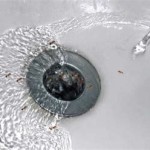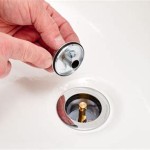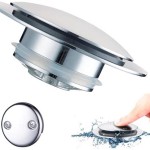What is a Stone Resin Bathtub Used For?
Stone resin bathtubs have emerged as a popular choice for homeowners and designers seeking a blend of luxury, durability, and aesthetic appeal in their bathrooms. These bathtubs are not constructed from solid stone as the name might imply. Instead, they are manufactured from a composite material typically consisting of crushed stone, such as marble or granite, blended with a resin, often acrylic or polyester. This combination results in a material that mimics the look and feel of natural stone while offering improved performance characteristics and design versatility.
The primary purpose of a stone resin bathtub is, fundamentally, to provide a bathing experience. However, their unique composition and properties extend their functionality beyond mere utility. The following discussion details various aspects of stone resin bathtubs, examining their composition, benefits, common applications, and comparative advantages over other bathtub materials.
Durability and Longevity
One of the key aspects that dictates what a stone resin bathtub is used for is its inherent durability. The combination of crushed stone and resin creates a robust material highly resistant to cracking, chipping, and staining. This makes it a suitable choice for households that see heavy bathroom usage. Unlike acrylic bathtubs, which can be prone to scratches and fading, or cast iron tubs, which can chip and rust, stone resin bathtubs maintain their pristine appearance for an extended period. The non-porous nature of the material also inhibits the growth of mold and mildew, contributing to a healthier and more hygienic bathing environment. Regular cleaning is typically sufficient to maintain the tub's surface, and minor scratches can often be buffed out, further extending its lifespan.
The durability of stone resin bathtubs also translates into long-term cost savings. While the initial investment may be higher than that for some other bathtub materials, the reduced need for repairs or replacements offers a significant advantage over time. Furthermore, the inherent insulation properties of stone resin help to retain water temperature for a longer time, minimizing the need to constantly add hot water, which can translate into lower energy bills.
Stone resin's resistance to thermal shock is another crucial factor contributing to its longevity. The material can withstand sudden temperature changes without cracking or warping, making it ideal for use with both extremely hot and cold water. This attribute is particularly important in regions with varying climates, where temperature fluctuations can be significant.
Aesthetic Appeal and Design Versatility
Beyond their practical attributes, stone resin bathtubs are frequently chosen for their aesthetic appeal. They offer a luxurious and sophisticated look that can elevate the overall design of a bathroom. The material can be molded into a wide variety of shapes and sizes, allowing for the creation of unique and visually stunning designs. From sleek, minimalist freestanding tubs to more traditional clawfoot models, stone resin can be adapted to suit a wide range of architectural styles.
The availability of different colors and finishes further enhances the design versatility of stone resin bathtubs. The manufacturing process allows for the integration of pigments into the resin matrix, resulting in a consistent and uniform color throughout the material. This eliminates the risk of color fading or discoloration over time. Different surface finishes, such as matte, gloss, and textured, can be applied to further customize the look and feel of the tub. This enables homeowners and designers to create a bathroom space that perfectly reflects their personal tastes and preferences.
The smooth, seamless surface of a stone resin bathtub is not only aesthetically pleasing but also contributes to its ease of cleaning and maintenance. The absence of grout lines or other crevices eliminates potential areas for dirt and grime to accumulate. This helps to maintain the tub's pristine appearance and reduces the amount of time and effort required for cleaning. Furthermore, the smooth surface provides a comfortable and luxurious bathing experience.
The design flexibility also allows for incorporating features such as built-in overflows, integrated faucet decks, and contoured backrests. These features enhance the functionality and comfort of the bathtub, making it a more enjoyable and relaxing space. The integration of these elements seamlessly into the design contributes to the overall aesthetic appeal of the bathroom.
Thermal Properties and Comfort
The thermal properties of stone resin are a significant advantage over other bathtub materials. Stone resin is a naturally insulating material, which means it retains heat effectively. This allows bathwater to stay warmer for longer, providing a more relaxing and enjoyable bathing experience. Unlike acrylic tubs, which can quickly lose heat, or metal tubs, which can feel cold to the touch, stone resin tubs provide a consistently comfortable temperature.
The insulating properties of stone resin also contribute to energy efficiency. By retaining heat more effectively, the need to add hot water frequently is reduced, thus lowering energy consumption and potentially reducing utility bills. This makes stone resin bathtubs a more environmentally friendly choice compared to other less efficient materials.
Furthermore, the solid construction of stone resin bathtubs helps to dampen sound. This reduces noise from filling the tub and from bathwater movement, creating a quieter and more peaceful bathing environment. This is particularly beneficial in homes with multiple occupants or in areas where noise levels are a concern.
The smooth, non-porous surface of stone resin feels comfortable against the skin. Unlike some other materials that can feel rough or abrasive, stone resin provides a luxurious and relaxing bathing experience. The material is also resistant to temperature extremes, preventing it from feeling too hot or too cold to the touch.
The dense structure of stone resin provides inherent structural stability, minimizing flexing or movement during use. This creates a more solid and secure feeling, enhancing the overall bathing experience. This stability also contributes to the longevity of the bathtub, as it reduces stress on the material and minimizes the risk of cracking or warping.
In addition to these core functionalities, stone resin bathtubs are sometimes modified with additional features like whirlpool jets or chromatherapy lighting further enhancing the bathing experience turning it into a spa-like retreat. These additions demonstrate the adaptability of stone resin and underscore its capacity to fulfill diverse bathing preferences.
Ultimately, the choice of a stone resin bathtub involves balancing aesthetic desires, functional needs, and budgetary considerations. However, its inherent durability, design versatility, and thermal properties position it as a prominent choice for those seeking a long-lasting, beautiful, and comfortable bathing solution.

What Is A Stone Resin Bathtub

What Is A Stone Resin Bathtub

What Is Stone Resin 2024 Guide Badeloft

65 Stone Resin Stand Alone Tub With Pop Up Drain Giving Tee

Stone Resin Freestanding Bathtub Luxury Flatbottom

Vanityfus 59 In Stone Resin Flatbottom Solid Surface Freestanding Double Slipper Soaking Bathtub White With Brass Drain Vf Clow36 S The Home Depot

65 Stone Resin Stand Alone Tub With Pop Up Drain Giving Tee

High Quality Artificial Stone Resin For Attach Rectangle Bathroom Bathtubbs

Bathtubs

63 Double Slipper Center Drain Freestanding Tub Giving Tree Home
Related Posts








